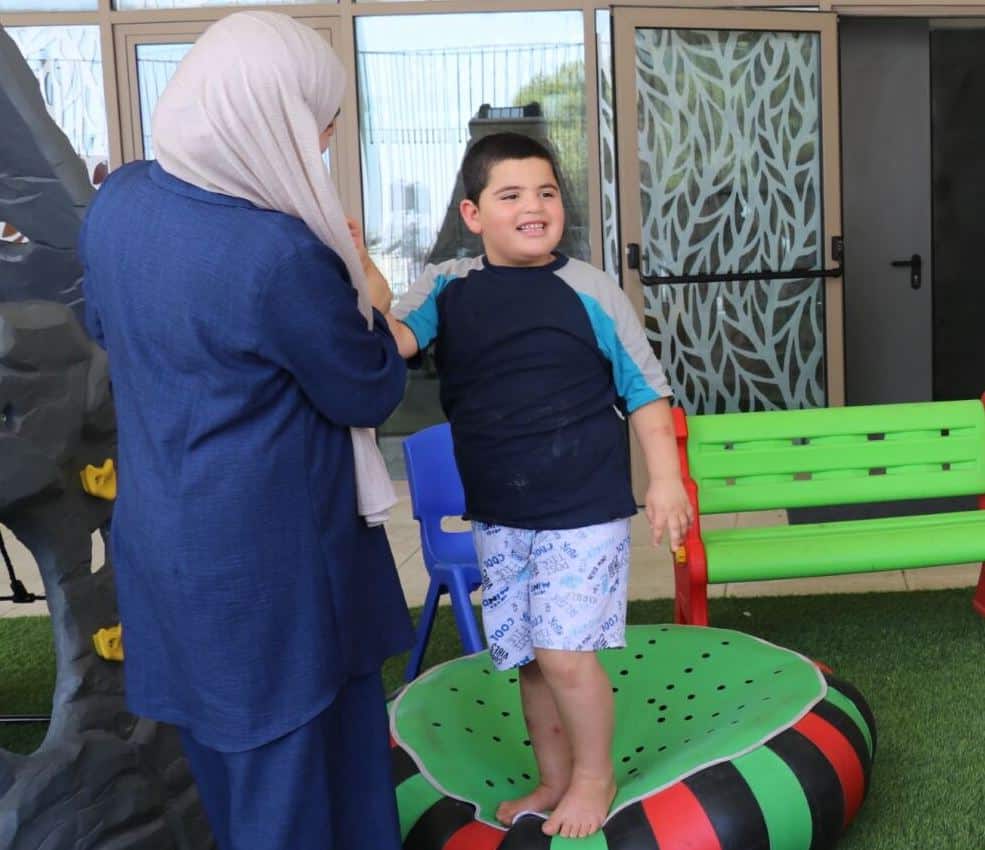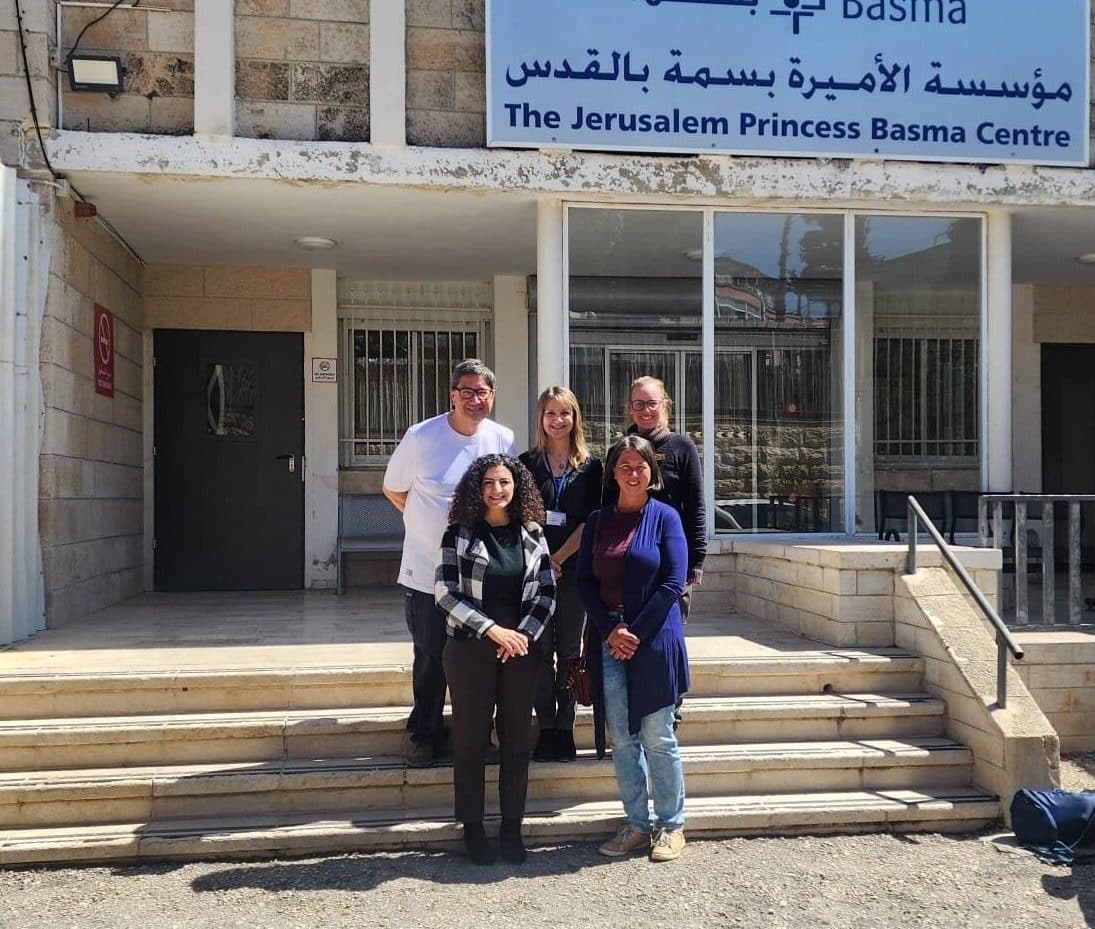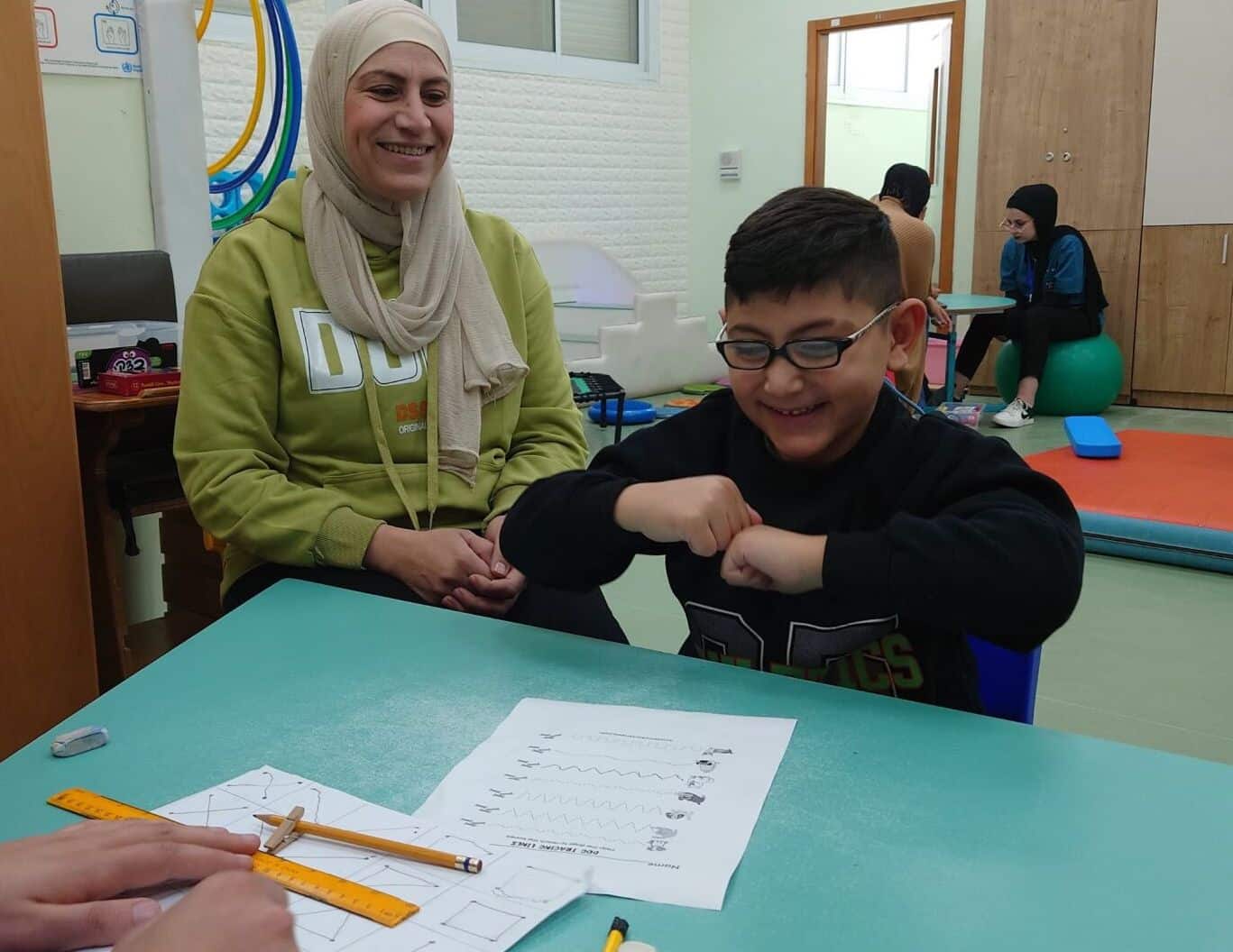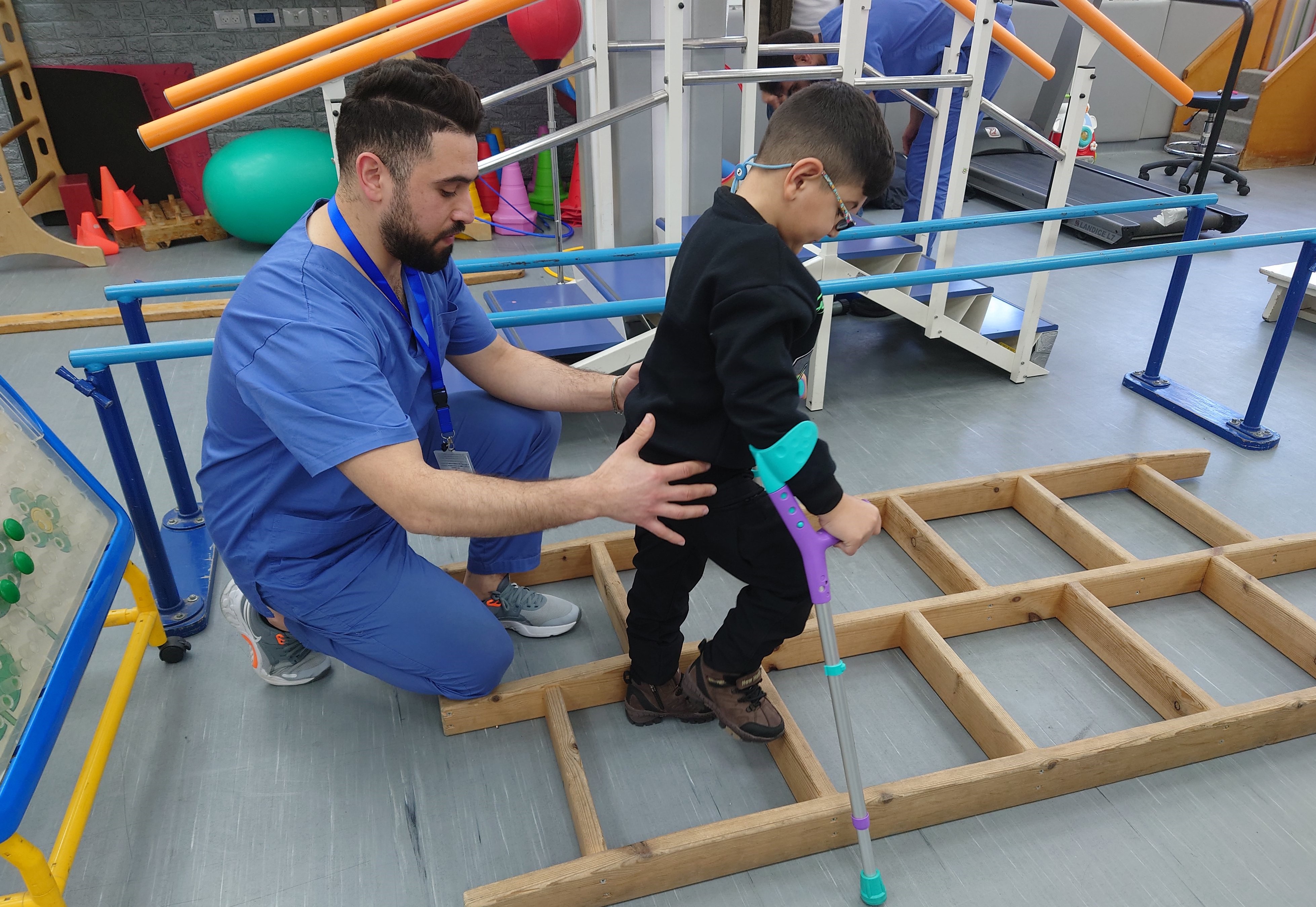Audio option:
Miracles still happen on the Mount of Olives.
A few months ago, our team of Ecumenical Accompaniers visited the Jerusalem Princess Basma Centre (JPBC) to witness its work firsthand. We saw how despite the immense challenges of life under Israeli occupation, the Basma Centre offers Palestinian children with disabilities life-changing care.
‘I take hope from this place. At first it was hard, but I have grown in strength, and I feel positive and optimistic about my son’s future as he learns to be more independent.’
Raja’a, mother of Naffa’ who has cerebral palsy
JPBC is a world-class rehabilitation centre for children and their families in the heart of occupied Palestine—an inspiring model of Palestinian resilience. Yet it operates in an environment where accessing healthcare is a constant struggle. Despite these challenges, JPBC continues to provide life-changing care to some of the West Bank’s most vulnerable children.
Israel, as the occupying power, is legally obligated under international law to ensure access to healthcare for Palestinians. Yet this right is constantly violated. Military raids, movement restrictions, settler violence, and checkpoints isolate entire communities—especially in remote areas—denying them life-saving care. Medical workers and facilities are routinely attacked, harassed, and even detained. Despite the presence of skilled staff and functioning hospitals, access is often deliberately obstructed by the Israeli military, leaving the West Bank’s healthcare system in a constant state of emergency. Physicians for Human Rights-Israel (PHRI), an Israeli human right’s organisation warned:
We are concerned by the systematically delayed and insufficient response of Israeli authorities to PHRI’s documentation of attacks against Palestinian health care teams. Attacks on healthcare teams are contrary to international law, grievously impact the right to health and must receive the necessary attention by the occupying power.
The Israeli military justifies attacks on healthcare in the West Bank as standard “counter-terrorism operations”, assures it “takes action to prevent harm of medical workers”and denies that healthcare is deliberately targeted. But the World Health Organisation data shows that attacks on healthcare are “regular, daily, and deadly”.
The situation has worsened sharply since October 2023.
In Gaza, Israel has systematically targeted and destroyed the healthcare system: nearly all 36 hospitals have been damaged or destroyed, with only 17 partially functional, forcing many of the wounded to die without care. Between 500–1,151 health workers have been killed, and over 300 arbitrarily detained. Many have reportedly been tortured and held incommunicado.
The UN Human Rights Office warns this is part of a pattern of attacks that may constitute war crimes under international humanitarian law, which protects medical staff and infrastructure in conflict.
In the West Bank, the World Health Organisation (WHO) recorded 694 attacks on healthcare facilities in the West Bank from October 2023 to December 2024. A report by World Vision in April 2025 highlights how these challenges have intensified: escalating violence, prolonged checkpoint closures, financial hardship, and severe shortages of supplies have cut off many communities from essential medical care. The impact is most severe in areas such as refugee camps and rural areas where permanent health facilities are already scarce—and Israel’s decision to ban UNRWA – the UN agency supporting Palestinians – from operating fully has worsened the crisis. The West Bank was completely locked down during the recent escalation between Israel and Iran, making access to healthcare in Jerusalem nearly impossible.
This is the harsh reality in which JPBC works—offering not just therapy, but dignity, care, and hope. Sobhi’s Mother from Jenin and says:
“Despite the difficulties of war, I crossed three checkpoints to reach the Basma Centre, but I insist on keeping my child’s therapy sessions. I feel safe here.”

Sobhi and his mother in the playground at the Centre
The Centre
When we visited the Jerusalem Princess Basma Centre (JPBC), staff told us how it first opened its doors in the 1960s to support children affected by the polio outbreak. Since then, it has become a vital lifeline for children with disabilities from across Palestine.
Today the centre provides holistic services for children including: an inclusive school, health facilities, and rehabilitation services and early intervention programmes for children with disabilities and their families across Palestine. It operates under the umbrella of the Arab Anglican Episcopal Church in Jerusalem and the Middle East.
The centre was founded at a time when East Jerusalem was under Jordanian control, which ended when Israel began its military occupation of the West Bank in 1967. The centre is named after the late King Hussein’s sister, Princess Basma. Basma is the Arabic word for ‘Smile’. The JPBC is very much a place for smiles today.
The Centre’s work
“Despite challenges and limited resources, we remain committed to maintaining and enhancing the quality of our services. Through creativity and resilience, our team continues to serve Palestinian children with disabilities and their families, bringing quality health services to their local communities. We stay true to the pursuit of this message of healing and to deeply touching people’s lives with our work, making a difference and creating lasting change.”
General Director, Violette Mubarak

EAPPI visit to the Basma Centre
We saw how services at the Centre are carefully designed to be holistic in terms of assessing and addressing the needs of disabled children and their families. Staff do this to ensure each receives a unique treatment plan, tailored to their individual needs.
JPBC implements long-term community-based programmes and has always maintained a clear vision of providing comprehensive rehabilitation and inclusive education through its Child Rehabilitation Centre and the inclusive school.
Recently, JPBC has explanded its Outreach Programme, through a network of partner centres, to provide support to underserved communities throughout the West Bank. This has included a particular focus on the ‘J2’ area of outer Jerusalem which suffers from a severe lack of services due to its complex political location.
In 2023 JPBC established a satellite unit in Gaza. All JPBC’s work is inspiring, but against the odds the Gaza unit has continued to provide vital children’s rehabilitation services throughout Israel’s catastrophic military campaign in Gaza.
Child rehabilitation
Staff told us how rehabilitation from disability and accident is at the heart of the JPBC’s work. Children with congenital, neuromuscular and developmental disorders receive rehabilitation services, as well as social and emotional care. Children from Jerusalem are treated on an outpatient basis; children from the West Bank, if permits can be obtained, and children in Gaza could enrol in residential programmes for periods of 2-3 weeks (before October 2023).
During our visit, we were shown around the Centre’s rehabilitation unit. We watched as therapists gently guided children through exercises in the physiotherapy room, and saw speech and occupational therapy sessions taking place just next door. Staff explained that the Centre also provides hydrotherapy, music therapy, autism support and psychosocial care — all under one roof.

Naffaa’ and his mother Raja’a in session at the Centre
The Inclusive School
The Centre’s Inclusive School was in session when we visited. Children with and without disabilities shared classrooms and played together in the courtyard. A teacher told us that about a third of the students have disabilities — some with cerebral palsy or autism — and that every child follows a personalised education plan to help them thrive in this integrated environment.
Specialist classes – for example for children with cerebral palsy or autism – are run, after which the child is included in school or referred to an appropriate special school. Most children in these programmes reach JPBC’s own inclusive school.
JPBC’s Mother and Child Empowerment Programme
The Princess Basma Centre also has a residential treatment programme called the Mother and Family Empowerment Programme. Over the course of three two-week blocks across 12 months, the programme empowers parents with the skills and confidence to become their child’s “home therapist” while also receiving vital psychosocial support.
Workshops are run by social workers to raise the self-esteem of mothers and their belief in their child to increase awareness and knowledge so that the parent can become a strong advocate for their child in the wider community.
The Outreach Programme

Physiotherapist with child, Naffaa’ at the Centre
Ismail, a physiotherapist from the Centre says:
“I am well as long as I can make a real difference in the lives of others, by providing therapeutic support to children who need rehabilitation to regain their ability to move and live with dignity.”
Ismail, Physiotherapist
Through its Outreach Programme, the Jerusalem Princess Basma Centre (JPBC) extends its care to children across the West Bank. On average, the team makes 60 field visits each year, assessing over 1,300 children—many of whom live in areas without access to specialist medical care. Children needing more intensive support are referred to JPBC’s main rehabilitation centre in East Jerusalem.
The Outreach team doesn’t just deliver care—they build capacity. Local clinicians and partner organisations receive regular training, helping ensure long-term access to high-quality rehabilitation in communities where services are scarce.
This work is a direct response to the systemic barriers faced by families in occupied Palestine: the lack of disability services in the West Bank, the difficulty of securing permits to access East Jerusalem, and the high cost of travel. JPBC’s programme helps bridge those gaps. Referred children can stay at the Centre during treatment, easing the burden on their families.
During our visit, staff told us how these efforts are not just about short-term treatment—they’re about building a future where all children with disabilities in Palestine can access the support they deserve.
Care from Jerusalem to Gaza
“I am well as long as Gaza, its people, and its children are well. In safety, God created all goodness and nothing can surpass that. That is why we really need your breath, your very heart and soul to revive this.”
Al Zahraa, Occupational Therapist in the Gaza satellite unit
JPBC has a satellite unit in Gaza. Despite the violence since 7 October 2023, which has led to staff being displaced and the unit damaged, the facility has continued to provide services to children in Gaza, under supervision of colleagues in Jerusalem. JPBC has a steadfast commitment for this to continue, despite the seemingly impossible situation.
Its specialised services include physio and occupational therapies and psychological support to ensure a holistic approach to care and are tailored to help the affected child overcome physical, cognitive and emotional trauma. This is very much like a candle in the darkness and a small beacon of hope for the people of Gaza.
JPBC is running a therapeutic unit at Gaza’s Al Ahli Arab Hospital as well as working in refugee areas in Gaza. This is in addition to ensuring that children with disabilities from birth continue to be served.
Amidst the catastrophic violence, in 2024 the unit treated 415 children at Al Ahil hospital – 319 with chronic disabilities and 96 post-acute cases resulting from war related injuries. In addition, 225 children were treated in displaced areas in camps, shelters and tents. 4,000 therapy sessions were completed including physiotherapy and psychological support.
In April, the Al Ahli hospital was devasted by Israeli air strikes that destroyed its last operating theatres. JPBC was in touch with the Princess Basma team in Gaza following the airstrikes, providing encouragement and support. Despite everything, this precious work continues.
“I am well as long as I see the smiles of people, reflecting their satisfaction and trust in me to provide services for their children. They are my source of positive energy. Every time I witness their progress and improvement, my passion to serve them grows even more, and my hope increases for the recovery and development of everyone receiving care at our centre.”
Doctor Said, GP in the Gaza satellite unit
JPBC operates at 100% capacity as it stretches to provide services across Palestine. Like many organisations working under occupation, JPBC faces ongoing challenges, including restrictions on movement and limited access to funding and resources. Yet, its staff persist—with creativity, care, and commitment—to deliver life-changing support.
“The journey ahead may be long, but it is worthwhile. Persevere. Be hopeful.”
Raja’a, mother of Naffa’ who has cerebral palsy
Take action!
Learn more about the Centre’s work and how to support it:
1. Watch a short video from JPBC.
2. Read the story of Naffaa’ – a case study of a child with cerebral palsy
3. Visit the JPBC website, Facebook and Youtube page.
What does international law say?

